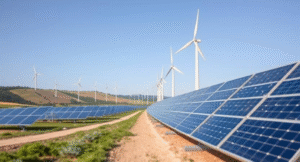In its new strategic organization dedicated to climate policy, the European Union has launched the first carbon border tax known as the Carbon Border Adjustment Mechanism (CBAM).
CBAM, or Carbon Border Adjustment Mechanism, is a mechanism aimed at regulating CO2 emissions in international trade and is part of the European Green Deal. It involves a system that allows countries to impose a tax or fee on imported products that are produced with a high level of CO2 emissions. The establishment of this mechanism began with the adoption of Regulation (EU) 2023/956 by the European Parliament and Council on May 10, 2023. The price of CBAM fees would be linked to the price of EU emissions allowances within the EU Emissions Trading System (EU ETS).
For companies and importers outside the EU, particularly in the Western Balkans region, this mechanism represents a significant challenge but also potential for improving their production practices. This part of the Green Deal obliges all companies involved in supply chains to strategically adjust their practices, taking environmental protection into account.
In Bosnia and Herzegovina, the implementation of CBAM is defined by international obligations such as the Paris Agreement (of which Bosnia and Herzegovina is a member) and the Sofia Declaration (which Bosnia and Herzegovina has accepted).
CBAM came into effect on January 1, 2023, and the gradual adjustment system will be in place until January 1, 2026. Once the permanent system takes effect, importers will be required to report the quantity of goods imported into the EU in the previous year and their embedded greenhouse gas emissions. They will then submit the appropriate number of certificates, the price of which will be calculated based on the weekly average auction price of EU ETS emissions allowances expressed in € per ton of emitted CO2. This will apply to products in six carbon-intensive sectors highly exposed to international trade: aluminum, cement, iron and steel, electricity, hydrogen, and fertilizers. According to Article 6 of the mentioned Regulation, importers will need to obtain a “CBAM” declaration with the quantity of goods, embedded emissions, and payment confirmation for the carbon import tax.
Compliance with CBAM and the implementation of the carbon border adjustment mechanism by the EU are significant steps toward addressing carbon leakage and ensuring a level playing field for European companies worldwide in relation to cheaper goods from China and India. This mechanism allows the EU to unilaterally impose taxes on imports from countries that do not meet the environmental standards set by the EU. However, the implementation of CBAM requires a robust compliance framework to ensure transparency, accuracy, and efficiency.
The following are key considerations for the EU regarding CBAM:
1) establish clear and objective environmental standards that companies must meet to avoid tariffs. These standards should be based on internationally recognized methodologies and criteria.
2) require companies to provide detailed data on their carbon emissions and energy consumption. These data should be verified by an independent third party to ensure their accuracy and reliability.
3) establish a robust verification and enforcement mechanism to ensure compliance with CBAM. This mechanism should include regular reviews of company emissions data and on-site inspections of their production facilities.
4) ensure that the mechanism does not violate the international obligations of WTO member states, and engage in dialogue with strategic trading partners such as China and the United States to align CBAM with global climate goals.
5) provide technical and financial assistance for capacity-building to invest in low-carbon technologies.
In the effort to remain competitive, understanding CBAM and its implementation is vital for the long-term success of companies outside the EU zone. Gradual awareness and strategic adaptation are crucial steps for individuals towards global sustainable development, which is likely to become an imperative in the future.






